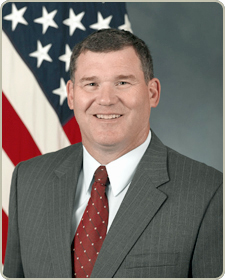
[SatNews] The space domain is no longer the relative sanctuary it once was and growing adversarial threats intend to deny the U.S. national security and economic benefits derived from space access, Defense Department officials told Congress on March 25th.

Deputy Assistant Secretary of Defense for Space Policy, Douglas L. Loverro.
Testifying before the House Armed Services Committee's subcommittee on strategic forces during the fiscal year 2016 national security space hearing, Douglas L. Loverro, deputy assistant secretary of defense for space policy, and other DoD officials discussed the importance of the department's space program and budget concerns.
Increased Budget Addresses Threats
"Those threats continue to mature and our adversaries are not sitting still—let me assure you—neither are we," Loverro said. "To address these threats, the department has increased its budget for space security by $5 billion. The substantial increase is intended to make certain that U.S. space forces are as dependable as the terrestrial forces which depend upon them."
Loverro said these investments, along with other changes, will make clear to all that attacks in space are not only strategically ill-advised, but militarily ineffective. "Notwithstanding our increased focus on the national security dimensions of space," he said, "we remain absolutely committed to ensuring the peaceful use of space for all." Space "is a global good," Loverro said, "and has been a driver for economic growth, environmental monitoring, verification of treaties and an enabler for everyday citizens at home and abroad."
Space Reliance
According to Loverro, several of the department's initiatives are intended to extend its commitment to the peaceful use of space, deter conflict in space and enhance the economic benefit that derives from space.
"We no longer can view space as a sanctuary," he said. "Potential adversaries understand our reliance on space and want to take it away from us—we won't let them," Loverro said. "The U.S. leads the world in space on the commercial side, the civil side and the national security side. We will not cede that leadership."
Together, with allies and commercial partners, he said, the United States will continue to defend the rights of all nations to space access for peaceful purposes. Loverro noted where that access is threatened or where others would seek to remove the national security or economic benefits derived from that access, DoD will defend its use just as the department would in any other domain.
Better Buying Power 3.0 Working

Mr. Dyke Weatherington is the Director, Unmanned Warfare & Intelligence, Surveillance, and Reconnaissance (UW & ISR), Strategic and Tactical Systems in the Office of the Under Secretary of Defense for Acquisition, Technology and Logistics and the Office of the Assistant Secretary of Defense for Acquisition.
Dyke D. Weatherington, acting deputy assistant secretary of defense for space, strategic and intelligence systems, told Congress the department has been able to leverage Better Buying Power initiatives to generate significantly lower costs and real savings in its negotiations for several space systems production contracts.
"We look forward to seeing how these latest iterations of Better Buying Power 3.0 will continue this trend and save the taxpayers real dollars," Weatherington said. "I'm also happy to report... that with a few exceptions, our defense and intelligence satellite constellations are currently in a relatively stable, healthy and well-populated situation to support both the nation and our warfighters," he said.
Many of these constellations will be entering a window of recapitalization in the coming years, he added. "How we approach these recaps will be a primary concern of the department," Weatherington said, "and will hinge on many ongoing analyses and study efforts—chief among those being the secretary's strategic portfolio review, and several key analyses of alternative studies."
Sequestration Harms Plans, Programs
Weatherington told the congressional panel that the department's plans and programs will be "drastically and harmfully impacted" if sequestration takes effect again.
Would-be adversaries, he said, are developing formidable capabilities designed to deny U.S. intelligence professionals and uniformed warfighters the asymmetrical advantages derived from the nation's space capabilities. "It's my job to ensure the department acquisitions for new capabilities stay abreast for this rapidly evolving challenge," Weatherington said, "and that our warfighters have the capability they need, but not at a price that is untenable to Congress and the American people."

Gen. John E. Hyten is Commander, Air Force Space Command, Peterson Air Force Base, Colorado.
Budget Control Act Relief
Air Force Gen. John E. Hyten, commander of Air Force Space Command, said a return to sequestration-level funding, set to take effect October 1 unless Congress acts, would increase risk.

Lt. Gen. John W. “Jay” Raymond is Commander, 14th Air Force (Air Forces Strategic), Air Force Space Command; and Commander, Joint Functional Component Command for Space, U.S. Strategic Command, Vandenberg Air Force Base, California.
"Returning to funding levels as directed by the Budget Control Act of 2011," he said, "Air Force Space Command is going to have a difficult time meeting operational requirements." Hyten added, "Compromises will be made, risk would be increased in any scenario, but we know that we have to continue to provide the nation with necessary capabilities and not lose ground in the space arena."
Air Force Lt. Gen. John W. Raymond, commander of 14th Air Force, and the Joint Functional Component Command for Space, which conducts space operations for U.S. Strategic Command, noted a return to Budget Control Act caps would threaten the nation's assured access to critical space capabilities. "I am concerned that if we do not receive relief from the Budget Control Act, our ability to provide our nation assured access to these critical space capabilities will be at risk," Raymond said.
"We are absolutely committed to ensuring global access to space and peaceful operations in and through the space domain," he said. "Credible, reliable and assured space capabilities are vital to our nation's strategic deterrence."
Story by Army Sgt. 1st Class Tyrone Marshall Jr.
DoD News, Defense Media Activity

